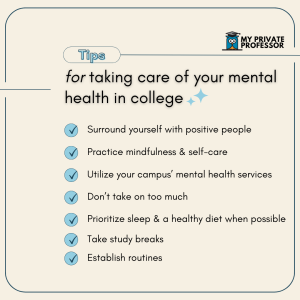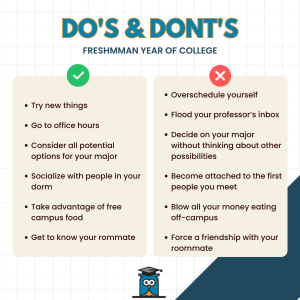If you were to ask a college student, “In one word, how would you describe your college experience?” they might have a very difficult time answering. The fact is, the college experience is so many things—all wrapped together in a bundle of all-nighters, awkward encounters, and mosh pits.
And there’s really no one way to be prepared for college. Although this may seem daunting, it’s really a blessing in disguise, because it means that you don’t have to worry about meeting some standards for preparation methods.
But luckily, you can arm yourself with various handy tips, and at least feel a little more comfortable plunging into the (slightly) unknown.
Of course—and I want to stress this—you shouldn’t take all of this in and then feel obligated to follow every single tip to a T. Rather, think of this as a handy guidebook that you can skim through and use as needed. After all, your college experience is yours.
Freshman year of college
- Explore all the campus food options to see what you like vs. dislike.
- When teachers are okay with it, audit classes into which you may want to transfer.
- Develop open communication with your academic advisor–this will pay off later!
- If you have an advisory, take advantage of the opportunity to make some new friends.
- Before classes start, decide what type of bag you want to use for your books and school supplies.
- If you have particular food accommodations (vegan, vegetarian, etc.) research the campus options and/or nearby restaurants.
- Get to know your new space by walking all over campus and exploring the facilities.
- Familiarize yourself with the library—come finals, you may be spending a lot of time there…
- If you’re friends with older students at the school, ask them for recommendations on clubs, activities, classes, teachers and campus events.
- If you’re feeling lonely/homesick, check-in with your friends from home—you may be surprised to hear that others are dealing with the same!
- Remember that, even if you were a straight-A student in high school, things might be a little different in college—and that’s okay.
- If you’ve put in the effort, but still find that you and your roommate don’t coexist well, look into the process for getting a new roommate—don’t settle!
- Go to the club fair–while the “cool” thing to do may be to skip the club fair and instead go enjoy the “sylly week” festivities, you may miss out on signing up for something you’d really enjoy.
- Get to know your RA, who might be the one person who can get you out of trouble!
- Experience at least one home sports game—even if you’re not into sports, let’s be real—watching isn’t required. These are fun, exciting events to take in with your new friends.
Career search
- 16. Attend job fairs—this can help you start investing in your future and considering what type of work you may want to do.
- 17. Revise your resume—most schools have an office of career development, where people will be happy to help you improve your resume and job applications.
- 18. Reach out to your professors to see if they can help you find internship opportunities.
Mental and emotional wellness
- Be okay saying no, and remember that personal boundaries are a necessity.
- Keep in touch with your parents—having that line of communication may provide you with comfort in the midst of all this change.
- Avoid comparing your college experience with someone else’s.

- Learn about which stress-coping strategies work best for you.
- Remember that, when sleep-deprived, you can never show up as your best self.
- Prioritize sleep and self care—especially during exam season!
- Prioritize healthy eating, which is linked to higher concentration and energy.
- If you’re struggling with your mental health, utilize on-campus resources such as mental health counselors.
Homework and studying
- Take study breaks during finals week to stay sane.
- Consider attending group study sessions.
- Figure out what type of study environment is best for you by trial and error–the library, a coffee shop, your room, common areas, the quad, etc.
- Review in chunks rather than saving it all for the night before a big test.
- During finals week, keep a to-do list for each class.
- Make sure you allocate enough time for self-care throughout finals week.
- Try incorporating movement into your study sessions, which has been shown to help with attention, memory, and alertness.
- Find and create playlists that help you stay motivated and energized—these will be helpful for concentrating during long study sessions.
- Limit distractions, but then use them as rewards when studying—for instance, if you get distracted from Tik Tok, reward yourself with five minutes of Tik Tok for every half hour spent studying (that is, if you have the willpower to keep it at five minutes only!).
- If you don’t have anyone who can quiz you, create flashcards and quiz yourself!
- Set goals for yourself before each study session.
- Take detailed notes in class, which will help you make solid study guides later on.
- Use study-helper apps to help you stay on track and also remind you to take breaks.
- Consider studying outdoors on nice days—as research shows, exposure to the outdoors can boost mood and concentration.
- Read your class notes out loud to help you process lots of information.
- Or try teaching someone else what you just learned!
- If you thrive when studying with others, reach out to your classmates and see who would like to make a study group.
- If your teacher doesn’t cover material from your reading, ask whether it’ll be on the upcoming exam.
- Write down questions you have while doing course reading or studying.
- Then, make sure to bring them up in class.
- If you’re having trouble with distractions from your phone, force yourself to put it out of sight for a period of time—then note how your productivity improves.
Finances
- Look into part-time jobs on campus.
- Apply for college scholarships.
- Shop at stores and restaurants that offer student discounts.
- See if the library has any of your required textbooks.
- Remember to file your FAFSA on time—to help you stay organized, write down all the important FAFSA deadlines in your planner/calendar.
- Consider making a budget if you want to make sure you’re not spending too much.
- Take advantage of the free student shuttle services to save money (and time spent parking).
Academics
- Consider multiple possibilities before settling on a major (and minor).
- Compare prices between physical vs. e-textbooks before buying your books.
- Or consider buying used books!
- During the first week of classes, notify your teachers of any accommodations.
- Attend office hours if you’re having trouble with assignments.
- Get contact information from people in your classes, which will come in handy if you have homework or study questions.
- If you have trouble paying attention in lectures while typing your notes, use online note-taking tools.
- Avoid citing Wikipedia in your research papers.
- If your teacher offers it, get feedback on drafts of your paper before submitting the final piece.
- Read all your syllabi to make sure you’re aware of teacher expectations.
- Communicate with your teacher if you’re dealing with something that might hinder your ability to complete assignments.
- If you expect your weekend to be filled with social events, knock out some assignments in your free time during the week.
- Eat a meal—or at least a snack—before a big exam.
- If you have trouble focusing on big lectures, sit near the front.
- Regularly check your email to make sure you’re not missing anything from your teachers.
- If you can’t come to class, ask a classmate to give you a rundown and/or share their notes with you.
- Practice your presentation skills on your friends before your actual presentation.
- When it comes time to register for classes, make sure you know exactly when your slot is.
- And register as early as possible, before classes fill up!
- If you’re allowed, flip through the entire test before starting so you get a better idea of how to budget your time.
- If you can’t figure something out in your homework after trying for a long time, take a break and come back to it later.
- Underline and highlight the main ideas in your textbook (if you own it)—this will help you identify important information when it’s time to review.
- Arrive a little early on exam day to reduce test anxiety.
- Circle or highlight major assignments on your syllabi.
- Don’t try to write everything down—it’s impossible, and will make you more stressed.
- Remember that you can always expand on your notes later!
- Summarize points in your own words rather than writing down points verbatim.
- Before submitting your assignment, make sure you’ve completed all the requirements.
- To save yourself time when writing papers, take advantage of a citation-generator, such as Perdue Owl.
- If you have questions about what will be on exams, ask your teachers—they’ll likely be happy to help you have a better understanding of what to expect.
- If you’re feeling overwhelmed with all your courses, consider dropping one and taking it over the summer instead.
College dorm life
- Get to know your roommate (putting in a little effort and becoming friends is worth avoiding an awkward year).
- If you’re looking to make new friends, consider keeping your door open (when you’re there).
- Attend your dorm events and get to know the people who live there.
- Communicate with your roommate if you plan to have people over.
- Communicate with your roommate about what you will and won’t share.

- Ask before you borrow your roommate’s items.
- Bring an extra set of bedding—sometimes you won’t have the time to wash your sheets, so you’ll want to have an extra set for when you’re cramped for time.
- If you’re not sure how to organize your room, get inspiration from your friends and dorm neighbors.
- Purchase a mattress pad to enhance your living space (and sleep quality!).
- Purchase storage/organizers—your freshman dorm room may be smaller than you had hoped…which is why under-the-bed or behind-the-door storage will be your best friend.
- If you have a fridge, make sure to clean it out every few days to avoid odors.
General life at college
- Get to know your class schedule during the beginning of school, before things get super busy—it can be helpful to make a physical copy that you can bring around with you during the first couple of weeks.
- Purchase all your school supplies before the first day of school if possible.
- Try out some of the fitness classes offered at your school’s gym.
- Think about when you’ll need to make arrangements for flying home for holidays/breaks.
- Get to know your community by volunteering—many schools offer opportunities for giving back such as working in local gardens, food kitchens, and schools.
- If you’re living on a huge college campus and your classes are spaced out, consider renting or purchasing a bike (or scooter).
- Look into quick and easy food options for between classes.
- If you’re feeling stir-crazy, look into fun and affordable weekend trips.
- Ask your older friends about their study-abroad experiences.
- Purchase a cheap camera if you want to have tangible memories of your college experience.
- Research your options for different study-abroad options before making a decision.








